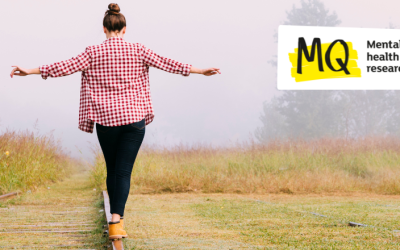April is Stress Awareness Month so to be aware of stress, honour it and deal with it appropriately, it’s important to be clear in the distinction that stress is not a mental health condition although it can be the cause of and the symptom of one.
We perhaps in society mistake “stress” as a mental illness partly as a hangover from the time when doctors might sign people off from work with “stress” instead of “undiagnosed or untreated mental health condition”. Perhaps also partly due to the rife epidemic of Post Traumatic Stress that veterans lived with for years after various wars in the past century. We’ll come back to these vital differences between stress and mental health conditions in a few paragraphs’ time.
What is stress and long-term stress?
Stress is the body’s natural nervous system response to a threat. Our bodies become stressed to prepare itself for an attack. It could be a physical threat, an emotional threat, an imagined threat or a threat we experienced a long time ago and haven’t fully processed yet.
Occasional stress is a part of life. Problems and even illness - both physical and mental - occur when we experience long-term or chronic stress.
In today’s world, we face different kinds of stress: stress of reading the news, screen time stress, tech stress, cost of living crisis stress let alone the stresses of relationships and workloads.
Our bodies can experience these external situations as a threat to our survival in one way or another. If it is ongoing, pervasive, it can be often hard to notice the impact that these stresses are having on us until symptoms become hard to live with. And this is why it’s vital to understand stress a little bit better.
This is partly why challenging the stigma of “getting on with it” and “pulling our socks up” isn’t sustainable. If we bury, deny or ignore our body’s response to stress we can’t run away from it. Our bodies store it.
If we ignore long-term stress it can turn into a mental health condition. Many are familiar with the term Post-Traumatic Stress Disorder and many are now becoming familiar with Complex Post Traumatic Stress Disorder. These are both mental health conditions with symptoms that can disrupt every day life due to traumatic events our minds and bodies have gone through. The difference between the two was outlined to me when I was in the early stages of being diagnosed with CPTSD in the following way:
- PTSD occurs mostly in adults who have been through a traumatic event and can be developed by anyone, even someone who has never had a history of trauma, mental health issues or other risk factors for mental illness.
- CPTSD, as the name suggests, is more complex and can be the result of ongoing trauma, abuse or adverse childhood experiences.
For example, a soldier knows they’re a soldier, they know there’s a war, they know what they experience. After experiencing traumatic events, they might develop symptoms of PTSD. But if a child in its formative years, while it’s brain and sense of self is developing, goes through ongoing and pervasive traumatic events, then the trauma informs brain structure, thought patterns, beliefs and more. It is common for a person with CPTSD to be diagnosed with 10-15 different mental illnesses before finally receiving this diagnosis.
Ignoring stress can lead to mental health conditions and physical health conditions. So, stress itself is not a mental illness. But it can cause them, and it can be a symptom of them.
Why is stress not mental illness?
Stress and mental illness are two concepts that are often used interchangeably, but they are not the same thing. While stress is a normal response to challenging situations, mental illness is a serious condition that requires medical attention.
Stress is a natural response to situations, environments and relationships that challenge us. Stress can be a physical stress in our bodies, intense and pervasive cognitive load (stress on our mental capacity) and increased emotional burdens. Stress is a normal part of life because life itself is challenging and, in small amounts, can be beneficial. Stress can help us stay alert and focused. However, when stress becomes chronic or overwhelming, it can have negative effects on our physical and mental health.
Chronic Stress can even lead to developing mental health conditions and physical health conditions. Therefore it is vital we learn to manage stress to prevent other more long term conditions arising.
Mental illness is a diagnosis of one of many serious conditions that affects a person's thoughts, feelings, and behaviours. Mental illness can be caused by a variety of factors, including genetics, environment, and life experiences.
Another difference is that mental illness is not a choice, but a medical condition that requires treatment. Stress isn’t always a choice, but sometimes we can find ourselves becoming addicted to the stress hormones and therefore start seeking stressful situations to get that familiar "high", and a familiar response.
The differences are clear, if we take the time to pay attention to our bodies, our minds, thought patterns, behaviour patterns and feelings. Whether you are experiencing symptoms of stress or mental illness, it's important to seek help. Neither stress nor mental illness is a character flaw, but with the right knowledge, support and guidance we can learn to manage and treat both.
Coping with Stress
Stress left unmanaged can lead us to develop coping mechanisms, often not consciously healthy ones. Our minds want us to survive and so if stress goes unmanaged it can lead to our energy reserves managing our nervous system for us: we can develop anxiety disorder or other anxiety related disorders like OCD to manage our pervasive stress levels, we can become so stressed our nervous system goes into a “freeze” response or “shut down” causing depression and alongside these responses our bodies can develop physical illnesses due to stress.
Some people might want to banish stress from our lives and profess that a stress-free life is a happier one. But a little acknowledged truth is that we all need some stress in our lives. Firstly, while it might sound lovely to lie on a beach relaxing for the rest of our life, our bodies adjust faster than we realise and our minds tend to find new sources of stress. It’s a survival instinct to perceive potential threats. So while we may relax for a short time in these quick fix scenarios, to make them the norm doesn’t adjust our ability to handle stress necessarily. It’s more sustainable if we adjust our daily routines to involve regular habits to manage stress levels.
Not only can we not all sit around in bubble baths all day or meditate all hours because our society isn’t built for us to do so. Plus our skin would get wrinkly from the suds! If we have too little stress we can experience lack of motivation and disinterest, maybe even leading to shut down. If we experience too much stress it can lead to agitation, overwhelm and burnout. There is an optimal level of stress in this bell curve and it’s where we are interested, excited, motivated, engaged in life and have purpose.
This stress awareness month we can also be mindful of positive stress and how it differs to negative stress. Negative stress is burnout, missed deadlines, arguments with loved ones, the pressures of negative self-talk, exasperation at the news, not being able to switch off, to sum up? Stress is the demands of a modern life.
Positive stress could be learning some new skill, positively stressing our bodies with exercise, positively stressing our minds with new experiences, positively stressing our interrelation skills with meeting new people, trying new things, pushing ourselves gently and with excitement, compassion and curiosity outside of our comfort zones.
Learn how to recognise and reduce stress in this article.



